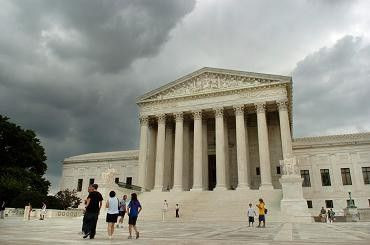Alabama Immigration Law Ruling: Why it Matters, and What's Next

U.S. District Judge Sharon Blackburn's decision to uphold key provisions of Alabama's controversial new immigration law -- characterized by supporters and detractors alike as the toughest in the country -- could have repercussions that reverberate far beyond the Yellowhammer State, with the issues raised by the legislation likely to land before the United States Supreme Court.
The Alabama law is one in a series of new state statutes asserting what the U.S. Justice Department referred to in its lawsuit as an enforcement-at-all-costs approach to limiting the number of illegal immigrants. As in Arizona and Georgia, Alabama lawmakers said that they were simply doing what the federal government would not. The federal government sued, maintaining that Alabama was exceeding its authority.
Although a state may exercise its police power in a manner that has an incidental or indirect effect on aliens, it may not establish its own immigration policy or enforce state laws in a manner that interferes with the federal immigration laws, the Alabama lawsuit read. The Constitution and federal immigration laws do not permit the development of a patchwork of state and local immigration policies throughout the country.
Blackburn's ruling revolved around the question of whether Alabama was pre-empting federal law, and she weighed each provision separately. She struck down a particularly contentious provision making it illegal to knowingly harbor, conceal or transport an undocumented alien, after determining that federal law governed the issue.
But on two of the harshest measures in the bill, Blackburn sided with Alabama. She upheld a provision requiring school district officials to check the immigration status of students, overruling the Justice Department's argument that the provision violated a law guaranteeing undocumented immigrant children the right to a public education. She also endorsed the constitutionality of a provision allowing police officers to detain those they have a reasonable suspicion of being in the country illegally and verify their status.
The Arizona immigration law contained a similar measure, and in April the Justice Department convinced a federal appeals court to block that provision by arguing that it delegated to local law enforcement the ability to enforce immigration law -- a power, they said, that resides in the federal government. The fact that Blackburn has handed down a contradictory ruling means heightens the possibility that the Supreme Court will take up the issue.
Because of the proliferation of state immigration laws, we need resolution from either the Supreme Court or Congress, Stephen Yale-Loehr, teaches Immigration Law at Cornell University Law School, told IBTimes. Right now, for example, it is very hard for national employers to know what they can or cannot do in various states.
The clash between state and federal power over immigration laws is not limited to the cascade of new state laws. The Obama administration has been moving to aggressively expand a federal program, known as Secure Communities, in which state and local law enforcement must enter the fingerprints of anyone they arrest into a Department of Homeland Security database -- resulting in deportations for arrestees who turn out to be undocumented. Critics have assailed the program, contending that it recruits local police officers to do the federal government's work, and several state governors have sought to opt out only to find that participation was mandatory.
I think that one of the open issues now, and its raised by the Alabama law and also Secure Communities, is what power does the federal government have over immigration, what power do the state governments have over immigration and what power does the federal government have to tell the states who to do when it comes to immigration? said Kevin Johnson, Dean of the University of California, Davis School of Law.
It seems to me at this point that when we have many states passing many immigration laws and you have the government enlisting the states and sometimes ordering them to enforce immigration law, something's got to give and you're going to need some kind of clarification from the court, he added.
You can contact the reporter at j.white@IBTimes.com
© Copyright IBTimes 2024. All rights reserved.





















